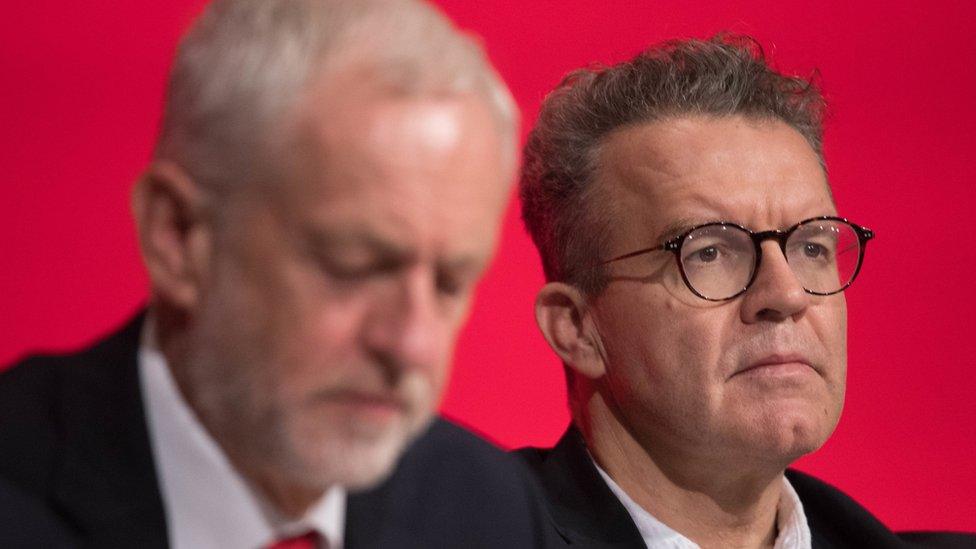Labour conference: Female joint deputy leader plan ditched
- Published

Plans for a woman to be elected joint deputy leader of the Labour Party have been withdrawn over concerns it would undermine Jeremy Corbyn.
Deputy leader Tom Watson said he was "very disappointed " by the move, which he blamed on "hard left" activists.
The plan was backed by the National Executive Committee and unions.
But it was withdrawn by the Constituency Labour Party that had tabled it, Wirral West, at the party's conference in Liverpool.
Documents seen by the BBC show that there was opposition from the Labour leadership on the idea.
They were believed to be concerned that an election for the new post raised the prospect of a candidate standing on a platform of a new EU referendum, ramping up pressure on the leadership over the issue, BBC Political Correspondent Iain Watson said.
One left-wing group, the Campaign for Labour Party Democracy, labelled the motion as "ill-thought through tokenism" and recommended that delegates vote against.
But the motion was withdrawn before a vote could take place.
Angela Marincowitz-Skillen, from Wirral West Labour Party, spoke in support of the principle but withdrew the plan, asking the NEC to find a way to hold elections for both deputies at the same time.
She said: "There have been disturbing reports that this rule change has widespread support because those who want to divide our party and deny Jeremy Corbyn want to use this as a way to do it, making an election about a new deputy leader about Brexit, a new centre party or whatever project they think up to sow disunity.
"I want to say to those people the membership are sick of this sectarian game."
Reacting to the decision, Birmingham Yardley MP Jess Phillips tweeted: "It's not a factional game for God's sake".
'Disgusting'
The female deputy leader proposal was championed by Unite leader Len McCluskey, and had initially been seen as an attempt to undermine Mr Watson, who has faced criticism from Mr Corbyn's supporters.
But he got behind the idea and told BBC News it was a "shame" it had been dropped.
He said: "I am very disappointed by that because I think it has put the cause of gender representation back in the Labour party.
"But the debate will continue. I think we need greater women's representation at all levels in the Labour Party and I am going to continue to campaign for that."
Allow X content?
This article contains content provided by X. We ask for your permission before anything is loaded, as they may be using cookies and other technologies. You may want to read X’s cookie policy, external and privacy policy, external before accepting. To view this content choose ‘accept and continue’.
Former NEC member Luke Akehurst tweeted: "Disgusting that Wirral West remitting has killed the chance of a woman second deputy Leader - because the Hard Left were scared a moderate would win, scared of party democracy."
Shadow foreign secretary Emily Thornberry, shadow equalities minister Dawn Butler, shadow education secretary Angela Rayner, shadow business secretary Rebecca Long-Bailey and shadow home secretary Diane Abbott were all being spoken of as contenders for the deputy leadership.
Analysis
By the BBC's Katy Dillon
It was Tom Watson who urged Labour's NEC to recommend a new deputy.
But the Labour leadership became suspicious of Watson's motives, and the BBC has seen the document they produced suggesting that the ruling body recommend voting against the motion.
But instead - due to the potentially difficult optics of the Labour Party not wanting a woman in leadership position - a "vote for" recommendation was granted.
The leadership were still said to be concerned. The fear stemmed from any such election turning into either a referendum on Jeremy Corbyn's leadership or, with a pro-second EU referendum candidate, a poll on Labour's position on the issue.
It's been said that the leadership did some canvassing on behalf of their preferred candidate - Dawn Butler - and the unfavourable response added to their concern that another less pliable candidate could win the title and cause further headaches.
It seems work was being done behind the scenes which resulted in the motion being withdrawn.
Although this may please the leadership in the short term, in the long term it could convince critics that Labour has a problem with women in leadership positions.